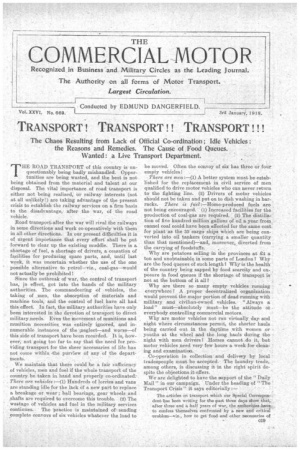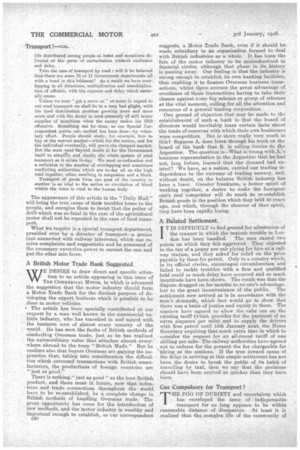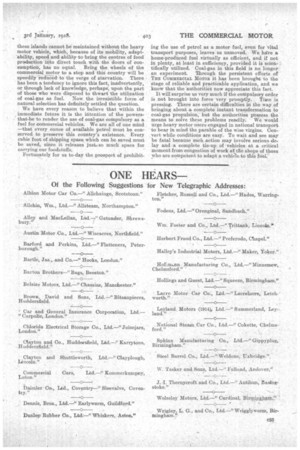TRANSPORT! TRANSPORT ! ! TRANSPORT ! ! !
Page 1

Page 2

Page 3

If you've noticed an error in this article please click here to report it so we can fix it.
The Chaos Resulting from Lack of Official Co-ordination ; Idle Vehicles : the Reasons and Remedies. The Cause of Food Queues. Wanted: a Live Transport Department.
THE ROA.D TRANSPORT of this country is unquestionably being badly mishandled. Opportunities are being wasted, and the best is not being obtained from the material and talent at our disposal. The vital importance of road transport is either not being realized, or railway interests (not at all unlikely!) are taking advantage of the present crisis to establish the railway services on a firm basis to the disadvantage, after the war, of the road vehicle.
Road transport after the war will rival the railways in some directions and work co-operatively with them in all other directions. In our present difficulties it is of Urgent importance that every effort' shall be put forward to clear up the existing muddle. There is a shortage of fuel, a shortage of drivers, a cessation of fkcilities for producing spare parts, and, until last week, it was uncertain whether the use of the one possible alternative to petrol—viz., coal-gas—would not actually be prohibited!
Since the outbreak of war, the control of transport has, in effect, got into the hands of the military authorities. The commandeering of vehicles, the taking of men, the absorption of materials and machine tools, and the control of fuel have all had this effect. In fact, the military authorities have only been interested in the devotion of transport to .direct militaryneeds. Even the movement of munitions and munition necessities was entirely ignored, and innumerable instances of the •,neglect—and worse—of this side of transport have been recorded. It is, however, not going too far to say that the need for providing transport for the sheer necessaries of life has not come within 'the purview of any of the departments.
We maintain that there could be a fair sufficiency of vehicles, men and fuel if the whole transport of the country be taken in. hand and properly co-ordinated: There are vehicles:—(1) Hundreds of lorries and vans are standing idle for the lack Of a new part to replace a breakage or wear ; ball bearings, gear wheels and ;shafts are required to overcome this trouble. (2) The wastage of vehicles and fuel in the military services continues. The practice is maintained of sending _complete convoys of six vehicles whatever the load to be moved. Often the convoy of six has three or four empty vehicles! .
There are men :—(1) A better system must be established for the replacement in civil service of men qualified to drive motor vehicles who can never return to the fighting line. (2) Drivers of motor vehicles should not be taken and put on to dish washing in bar_ racks. There is fuel :—Horne-produced fuels are not being encouraged. (1) Increased facilities for the production of coal-gas are required. (2) The distillation of five hundred million gallons of oil a year from cannel coal could have been effected for the same cost for plant as the 35' cargo ships which are being converted into oil tankers (carrying a smaller quantity than that mentioned)—and,moreover,_ diverted from the carrying of foodstuffs. , Why are potatoes selling in the provinces at 24 a ton and unobtainable in -some parts of London ? Why are the food queues of such length Why-is the health of the country being sapped by food scarcity and ex, posure in food queues if the shortage of transport is not at the bottom of it all Why are there so many empty vehicles running • everywhere ? A proper decentralized organization would prevent the major portion of dead running with military and civilian-owned vehicles. "Always a load" must—absolutely must—be the a.ttitude at . everybody controlling commercial motors.
Why are motor vehicles not run virtually day and night where circumstances permit, the shorter hauls being carried out in the daytime with women or , youths at the wheel and the long hauls during the night with men drivers Horses cannot do it, but motor vehicles need veryfew hours a week for cleanlug and examinatioo.
Co-operation in collection and delivery by local tradespeople must be accepted. The laundry trade,. among others, is discussing it in the right spirit despite the objections it offers.
We are delighted to have the support of the "Daily Mail" in our campaign. Under the heading of "The Transport Crisis" it says editorially :— The articles on transport which oar Special Correspondent has been writing for the ast three days show that, after three and a half years of war, the authorities have to confess themselves oonfronted by a 13.9V7 and critical nroblem--viz., how to get food and other necessaries of life distributed among people at home and munitions delivered at the parts of embarkation. without •confusion and delay.
Take the case-of transport by road : will it be believed that there are some 10 or. 11 Government departments all with a hand in this birsiness? As a result we have overlapping in all directions, multiplication and remultiplication of officials, with the expense and delay which natur ally ensue. , Unless we soon !` get a move on" at-home in regard to our road transport we shall he in a very had plight, with the food distribution problem 'growing more and more
.. acute and with the Army in need presently of still larger supplies of munitions when the enemy makes his 191B offensive. Something can be done, as our Special Correspondent points oat—indeed has been done—by voluntary effort. People should study, for example, how to buy at the itearest market—which for the nation, and for the individual eventually, will prove the cheapest market. But the -main need beyond doubt is for the Government itself to simplify and clarify the whole system of road transport as it exists ti-clay. We need co-ordination and a reduction in the number of overlapping and sometimes conflicting authorities which are to-day all on the' high road together, often resulting in congestion and a block.
Transpert of goods from One part of the country to another is as vital to the nation as circulation of blood within the veins is vital to the human body.
The appearance of this article in the "Daily Mail" will bring the true cause of their troubles home to the people, and energize them to insist that the policy of drift which was so fatal in the case of the agricultural motor shall not be repeated in the case of food trans port. • What ive require is a, special transport department, presided over by a director of transports-a genius (not connected with railway interests), which can receive complaints and suggestiohs and be possessed of the necessary executive. power to correct the one and put the other into force. •
A British Motor Trade Bank Suggested.
WE DESIRE to draw direct and specific atten. tion to an article appearing in this issue of THE COMMERCIAL MOTOR, in which is advanced the suggestion that the motor industry should form a Motor Trade Bank for the distinct purpose of developing the export business which is possible to be done in motor vehicles.
0 The article has been specially contributed at our request by a man well known in the commercial vehicle industry, who has traVelled in and mixed with the business men of almost every country of the world. . He has Seen the faults of British methods of conducting Overseas trade, just as. he has realized the extra:ordinary value that attaches almost every: where. abroad to the term "British Made," But he realizes also that buyers Overseas. axe gaining the impression that, taking into consideration the difficulties which surround transactions with British Manufacturers,. the productions of foreign countries are . "just as good:" There is nothings" just as good " as the best British product, and there must in future, now that industries and trade connections throughout the world . have to be. re-established, be a complete change in British methods of handling Overseas trade. The great opportunity has come for the introduction of tieW 'methods, and the inotor industry is wealthy and intpertanCenough to establish, as cur correspondent 020 suggests, a Motor Trade Bank, even if it should be made subsidiary to an organization formed to deal with British industries as a whole.' It has been the fate of the motor industry to be misunderstood in financial circles, although that phase in its history is passing away. Our feeling is that the industry is strong enough to establish its own banking facilities, thus enabling it to finance Overseas business transactions, whilst Ogre accrues the great advantage of avoidance of those transactions having to take their chance against some big scheme or group of schemes at the vitaI moment, ealling.for all the attention and resources of a general trading corporation.
One ground of objection that may be made to the establishment of sub -a bank is that the board of directors would inevitably learn certain facts about the trade of concerns with which their own businesses were competitors. Ent is there really very much in this'? Suppose A. does learn through his work on the board of the bank that B. is selling lorries to the Argentine. The question is—What is wrong with A's business representation in the Argentine that he had not, long before, learned that the demand had existed? -We have, as a nation, carried our trading independence to the extreme of trading secrecy, and, without doubt, on the balance British industry has been a loser. Greater. frankness, a better spirit of working together, a desire to make the foreigner one's real competitor will do much to re-establish British goods in the position which they held 50 years, ago, and which, through the absence of that spirit, they have been rapidly losing.
ABelated Settlement.
IT IS DIFFICULT to find ground for admiration of the manner in which the taxicab trouble in London has been handled. The men raised two points on which they felt aggrieved. They objected to the tax of a penny per cab plying for hire at a railway station, and they asked for relief on the price payable by them for petrol. Only in a country which, in its official circles, encouraged circumlocution and failed to tackle troubles with a firm and qualified hold could so much delay have occurred and so much ineptitude have been shown. The result was that the dispute dragged on for months to no one's advantage, -but to the great inconvenience of the public. The settlement now arrived at is in accordance with the men's ,demands, which fact would go to show that there was a basis .of justice and equity in them. The masters • have agreed to allow the cabs out on the existing tarif“which provides for the payment of an extra sixpence per mile) and to supply the drivers with free petrol until 15th January next, the Home Secretary requiring that much extra time in which to consider the request for an all-round tariff of one shilling per mile: The railway authorities have a-greed not to enforce for the present the fee chargeable for plying at the stations. If the true inward cause of the delay in arriving at this simple settlement has not been the desire to break the public of its ha-bit of travelling by taxi, then we say that the decisions should have been arrived at quicker than they have been.
GasCompulsory for Transport ?
THE FOG OF DUBIETY and uncertainty which has enveloped the issue of indispensable transport for so long appears to be within reasonable distance of dissipation. At least it is realized that the complex life of the commnnity of these islands cannot be maintained without the heavy motor vehicle, which, because of its mobility, adapt'ability, speed and ability to bring the centres of food production into direct touch with the doors of consumption, has no equal. Bring the wheels of the commerciad_motor to a stop and this country will be speedily ieclii-c-edto the verge of starvation. There has been a tendency to ignore this fact, inadvertently, or through lack of knowledge, perhaps, upon the part of those who were disposed to thwart the utilization of coal-gas as fuel. Now the irresistible force of natural selection has definitely settled the question.
We have every reason to believe that within the immediate future it is the intention of the powersthat-be to render the use of coal-gas compulsory as a fuel for commercial vehicles. We are all of one mind —that every ounce of available petrol must be conserved to preserve this country's existence. Every cubic foot of shipping space which can be saved must be saved, since it releases just so much space for carrying our foodstuffs.
Fortunately for us to-day the prospect of prohibit ing the use of petrol as a motor fuel, even for vital transport purposes, leaves us unmoved. We ha've a home-produced fuel virtually as efficient, and if not in plenty, at least in sufficiency, provided it is scientifically utilized. Coal-gas in this field is no longer an experiment. Through the persistent efforts of TILE COMMERCIAL MOTOR it has been brought to the stage of reliable and practicable application, and we know that the authorities now appreciate this fact.
It will surprise us very much if the compulsory order is not brought into force very promptly. Thine is pressing. There are certain difficulties in the way of bringing about a complete instant transformation to coal-gas propulsion, but the authorities possess the means to solve these problems readily. We would urge heavy motor users engaged in national transport to bear in mind the parable of the wise virgins. Convert while conditions are easy. To wait and see may be fatal because such action may involve serious delay and a complete tie-up of vehicles at a critical moment from 'congestion of work a the shops of those who are competent to adapt a vehiac to this fuel.
























